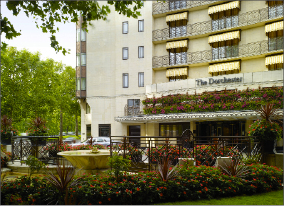


![]()
ONLINE

An Iconic Collection
Editors’ Note
Christopher Cowdray was appointed to his current post in November 2007, after serving as General Manager of The Dorchester in London since June 2004. He has 30 years of international experience in managing luxury hotels on four continents, including six years as Managing Director of Claridge’s in London. A native of Zimbabwe, where he earned a diploma in hotel management, Cowdray is also a graduate of the executive program at Columbia University’s Business School.
Company Brief
Dorchester Collection (www.dorchestercollection.com) is the successor to Dorchester Group, originally established by the Brunei Investment Agency in 1996 to manage its collection of hotels in Europe and the United States. The group’s portfolio currently encompasses The Dorchester in London, the Beverly Hills Hotel, the Hotel Bel-Air, The New York Palace, the Hôtel Plaza Athénée and Le Meurice in Paris, and the Hotel Principe di Savoia in Milan.
With all the challenges in this current economic climate, has Dorchester Collection and its properties felt a major impact, and how challenging is it today to find growth?
We certainly have seen an impact. London has been the least affected and The Dorchester is outperforming its market, so that’s the great news. But the luxury market has been hit. It’s probably not been as significantly hit as the middle market or resorts, but we have seen significant downturns in business so, unfortunately, there will be no growth this year.
Do you foresee opportunities in new markets for the Collection in this economic environment?
We’re fortunate to be able to take advantage of the current situation and look for properties that would fit within the portfolio within North America, Europe, and gateway cities in the Far East.

The Dorchester London
What are the most important characteristics that determine if a property has the individual strength to fit into the Collection?
It has to have a unique, iconic quality of some sort. If it’s a new building, it has to set the standards in hospitality and have the potential to be seen as an iconic hotel for years to come. On the whole, it’s looking for properties which are the market leaders in the cities that they’re in, and that have a unique vision, iconic value, and heritage.
All of your properties are well-known brands on their own. How do you balance the individual strength of each property with the understanding that they fall under the Dorchester Collection umbrella?
As a corporate team, working alongside the hotels’ executive teams, we’ve strived to build a solid foundation for Dorchester Collection that positively encourages the hotels to express their own personalities and strengths, while at the same time operating within a structured brand framework. By focusing on “the style of individuality,” we have discovered a winning formula – one that appeals to our people, our guests, and our owners.
In major cities like London, even with all its offerings, you still need to provide the high-end spa experience. Has that been a focus as well within the Collection?
It certainly is the focus. We recently opened a new Christian Dior spa in the Hôtel Plaza Athénée, as well as a new spa at The Dorchester, and we’re working on a new spa development at the Bel-Air. Our concept is different from the typical spa seen in many hotels, where they are Asian-influenced and focus on lots of different treatments; we’re looking at spas which will fit into the local environment. So in London and Paris, we offer a European-type spa where guests feel they can be pampered, but also indulge as well. For instance, at the Spatisserie at The Dorchester, you can order cake and champagne if you want, so it’s more than just going for a treatment.
What are the key traits that determine success in a general manager today?
Experience with the luxury market is important, as is understanding our business, who the customers are, and what their expectations are. So with that understanding, if you’re a real inspirational leader, and you have a good entrepreneurial spirit, then you can really drive the business of the hotel.
Many in this industry say one either lends himself more to running a property or more to assuming a corporate role. You seem to have found success at both. Do you miss being at a property?
I don’t. I loved the excitement of being at the hotel, but the challenges are different in the corporate role. Developing new hotels and the company are very exciting.
When the opportunity was presented to you, did you know right away that leading the Collection was a role you wanted to pursue, and has it been what you expected?
Yes, it has been more than I expected. I’m a person who is always looking for opportunity, constantly challenging the boundaries to find out how we can develop the company further and to make it into one of the world’s most successful luxury management companies. So there is an enormous amount to do and it’s exceedingly exciting, particularly in current times, where there is a lot more opportunity to grow the company even further.
As you look to the future for the Collection, is it important for you to maintain a more manageable size, or will you grow as opportunities arise?
It will be as opportunities arise. We will certainly be pursuing opportunities, but we don’t have the intention of being a large organization, in terms of numbers of hotels. We’re not chasing quantity – we’re chasing quality. If we reach 15 hotels in the next few years, we will have achieved our ambitions. If we achieve 20, then we will have done exceedingly well. But I don’t see the company growing any larger than that.
With all the current excitement over future opportunities, do you foresee a time when you’ll slow down and take it easy?
I love the pace, so it’s too early to say.